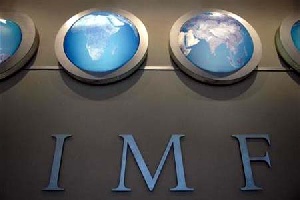Government’s refusal to submit the agreement covering the three-year International Monetary Fund (IMF) bailout programme to Parliament for approval before signing onto it in April last year is now threatening to derail the programme and deny Ghana access to disbursement of the next tranche of balance of payment support.
Under the programme, the IMF is demanding zero financing from the central bank of the budget deficit and state institutions.
The existing Bank of Ghana (BoG) Act 662 states that the total of the loans, advances, purchase of treasury bills and securities, together with money borrowed by the government from other banking institutions and the public at the close of a financial year, shall not exceed 10% of the total revenue of the fiscal year in which the advances were made.
This Act is before Parliament for amendment.
However, it has emerged that the Parliamentary Select Committee on Finance has unanimously deviated from the IMF demands which has occasioned the amendment, and has rather recommended a change to the BoG Amendment Bill to allow central bank’s financing of the budget deficit up to 5% of the previous year's total revenue.
If the agreement covering the IMF bailout programme had been subjected to parliamentary scrutiny, the current situation would not have arisen in the first place.
The recommendation of the Parliamentary Select Committee on Finance indicates that both sides of the house are likely to pass the 5% financing, which will be a big blow to the government and the future of the bailout programme.
The only way to avoid this bill from being passed is for the government to whip its Members of Parliament (MPs) in line to reject the 5% on the floor of the House for the committee to go back and revise it to zero financing.
The Parliamentary Select Committee on Finance is of the view that the zero financing provision being demanded by the IMF should be amended to a 5% limit because restriction on deficit financing is unfair since it will negatively affect national development.
If the bill is passed with the 5% amendment, it would likely make it harder for the fund's board to approve disbursement of the next tranche of balance of payment support.
Already, concerns have been expressed about the delay by the IMF Board on whether to disburse the next tranche of aid to Ghana following the third staff review of the programme in May.
“What I can tell you on Ghana is that, you know, the mission was there April to May. We’ve reached a general understanding with the authorities on the main elements that would support the third review under the IMF support to EFF.
“The authorities are in the process of finalising that work in a few areas, including a new public financial management law, an amended Bank of Ghana Act, and a strategy to address the debt of state-owned enterprises, subject to this work being completed and in line with our own procedures, of course.
“IMF staff will finalise the preparation for the required documentation of the board’s consideration of this review. That’s what I have on Ghana”, Gerry Rice, Spokesman, IMF Communications Department, told a press conference in Washington – USA on June 16, 2016.
Conventional wisdom favours the notion that limited central bank lending to the government is conducive to lower inflation, and this, if sustained over the long run, promotes higher rates of economic growth.
In April 2015, Ghana signed up to a three-year IMF Extended Credit Facility (ECF) of US$918 million to support medium-term economic stabilisation.
As with most international lending, however, this bailout package has strings attached.
Central bank credit to government, which has been a major source of financing the deficit, was curbed at 5% of previous year's tax revenue for 2015 and 0% for 2016 and 2017.
The share of interest payment on debt in overall government expenditure has grown from 8.5% in 2008 to 23.2%.
Business News of Monday, 25 July 2016
Source: thefinderonline.com

















